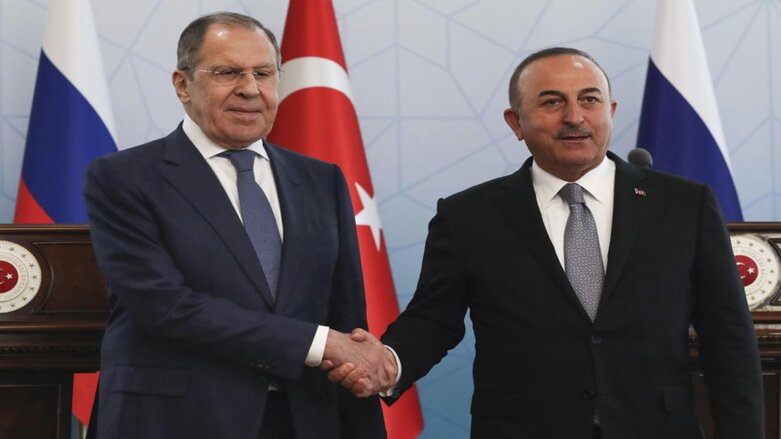US welcomes Turkish efforts with Russia to free Ukrainian grain

WASHINGTON DC (Kurdistan 24) – Russian Foreign Minister Sergei Lavrov visited Turkey on Wednesday for discussions with his Turkish counterpart Mevlut Cavusoglu.
Although their talks covered a wide range of matters, the top issue was the huge amount of grain—some 20 million tons—that remains trapped in Ukraine because of the extended conflict with Russia.
Turkey is trying to find a way to export that grain, and a State Department spokesperson, responding to a question from Kurdistan 24, affirmed US support for this Turkish effort.
The Ukraine crisis has provided Turkey significant leverage with both Russia and the US. Turkish President Recep Tayyip Erdogan would like to use that leverage to create a "security zone" in Syria, along its border with Turkey, to push the Kurdish-led Syrian Democratic Forces (SDF), America's main partner in the fight against ISIS in Syria, 30 kilometers to the south.
The US has repeatedly warned Turkey against such action, while Russia, it seems, remains committed to restoring Damascus' control over the entire country. Consequently, the SDF appears inclined to talk to the Syrian regime for protection against any Turkish attack.
Ukraine's Large Agricultural Production at Risk
Ukraine is the world's fifth largest exporter of wheat, the fourth largest exporter of corn, and the top exporter of sunflower oil. Ukraine ordinarily exports those products through its Black Sea ports.
However, Ukraine has mined its Black Sea coast to prevent Russia from attacking it from the sea. At the same time, Russia is blockading those ports, preventing weapons from going in and ordinary exports from going out.
Meanwhile, the trapped produce will be in danger of rotting, contributing to the ongoing rise in global food prices and even food shortages in poorer countries.
The UN Secretary-General Antonio Guterres has developed a proposal to create secure shipping corridors in the Black Sea to allow Ukraine to export its agricultural products.
Turkey as Intermediary between Ukraine and Russia
Turkey has a key role to play, partly because of geography. It controls the Dardanelles, which, in turn, controls traffic in and out of the Black Sea. In addition, Turkey maintains friendly relations with both Ukraine and Russia.
Wednesday's discussion between Cavusoglu and Lavrov on enabling Ukraine's agricultural exports focused on Guterres' plan. Asked about Ankara's efforts, a State Department spokesperson told Kurdistan 24 that we "appreciate Turkey's efforts to mediate diplomatic discussions."
Noting that Turkey "is a long-standing and valued NATO Ally," the spokesperson listed key aspects of Turkey's position that the US sees as positive, even as Ankara has not joined in imposing sanctions on Moscow.
"Turkey has expressed strong support for Ukraine's sovereignty and territorial integrity in the face of Russia's aggression," the spokesperson told Kurdistan 24, while "President Erdogan has characterized Russia's action as 'unacceptable.'"
"We strongly support the resumption of grain exports from Ukraine to alleviate global food insecurity that Russia's war has exacerbated," he continued, stressing, however, that Ukraine must be "fully involved in any decisions" while "any plan should not enable Russia to further its own military aims."
Finally, he affirmed, "Russia needs to immediately cease its aggressive actions" against "civilian traffic in the Black Sea so Ukraine can reopen its ports" and "boost global food supplies, especially for those countries most in need."
Yet Wednesday's talks in Ankara appear to have made little progress. Russia's position is that all that is required to facilitate Ukraine's exports is for Ukraine to remove the mines it has laid down. But Ukraine fears that Russia would attack from the sea if it did so.
In addition, Moscow wants the US and European sanctions lifted in exchange for allowing the free passage of Ukrainian goods—and the US and Europe are most unlikely to agree. Indeed, lifting sanctions on Russia would violate a condition the State Department spokesperson cited to Kurdistan 24: no plan for Ukrainian exports should help Russia advance its military goals.
No Green Light for Syrian Attack—SDF will talk to Damascus instead
Just as Erdogan maintains a strategic aim of establishing a Turkish-controlled "security zone" in northern Syria, Russia's strategic aim is to re-establish Damascus' control over the entire country. Moscow has advised the SDF to speak with Damascus to protect themselves against a possible Turkish attack.
So the SDF leadership, which had earlier this year openly rebuffed a call from Moscow to talk with Damascus, on Tuesday announced that it was prepared to do just that.
Thus, Turkey did not receive the green light from Lavrov for the cross-border assault that Erdogan has long envisaged.
Food as a Weapon
The brutality of the Ukraine war is underscored by charges that US and European officials have leveled at Moscow: above all, its use of food supplies as a weapon of war.
Speaking to the UN Security Council on May 19, during a session devoted to food insecurity and conflict, US Secretary of State Antony Blinken denounced Moscow's "decision to weaponize food," describing Moscow as "a government using the hunger of civilians to try to advance its objectives."
Blinken also noted that Lebanon gets 80% of its wheat imports from Ukraine.
Similarly, the head of the European Commission, Ursula von der Leyen, speaking to the European Parliament on Wednesday, warned, "Food has become part of the Kremlin's arsenal of terror, and we cannot tolerate this."
Describing Russian actions in Ukraine and their implications, she denounced the "cold, callous and calculated siege," which "threatens some of the most vulnerable countries and people in the world."
